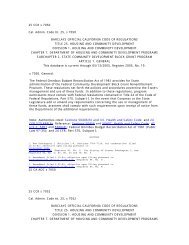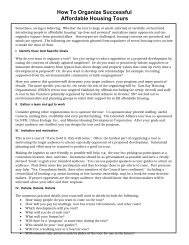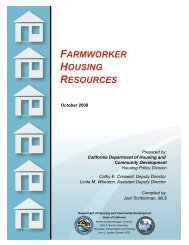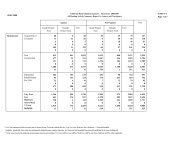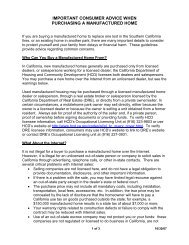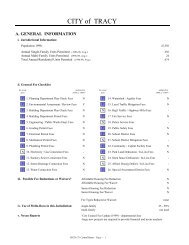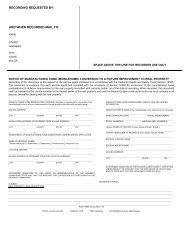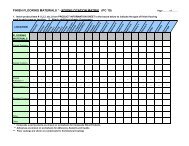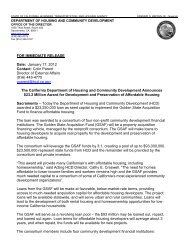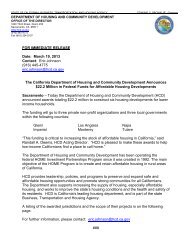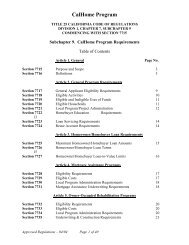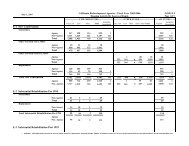Adobe PDF - California Department of Housing and Community ...
Adobe PDF - California Department of Housing and Community ...
Adobe PDF - California Department of Housing and Community ...
You also want an ePaper? Increase the reach of your titles
YUMPU automatically turns print PDFs into web optimized ePapers that Google loves.
BOE PUBLICATION #47 <br />
Dealers <strong>and</strong> manufacturers as construction contractors<br />
You are considered a construction contractor for sales <strong>and</strong> use tax purposes when you furnish <strong>and</strong> install items<br />
that you are responsible to attach to real property. Please refer to publication 9, Tax Tips for Construction <strong>and</strong><br />
Building Contractors (see ordering information on page 31).<br />
Dealers<br />
If you are both a construction contractor <strong>and</strong> a licensed mobilehome dealer for a transaction, you are a retailerconsumer<br />
when you sell a mobilehome that will be installed on a permanent foundation <strong>and</strong> you may issue a<br />
resale certificate for the purchase <strong>of</strong> the mobilehome. As a retailer-consumer, you must report tax on 75 percent<br />
<strong>of</strong> the cost <strong>of</strong> the mobilehome on the return for the period during which the mobilehome is installed on a<br />
permanent foundation. For more on how tax applies to your sale, see page 2.<br />
Manufacturers<br />
Manufacturers are considered construction contractors when they sell a mobilehome without going through a<br />
dealer <strong>and</strong> install the mobilehome on a permanent foundation. The manufacturer is the consumer <strong>of</strong> the materials<br />
<strong>and</strong> the retailer <strong>of</strong> any fixtures supplied <strong>and</strong> installed. (When the customer is the U.S. government, the<br />
manufacturer is the consumer <strong>of</strong> all related fixtures <strong>and</strong> materials <strong>and</strong> the retailer <strong>of</strong> furniture <strong>and</strong> unattached<br />
accessory items.) See the next section for information on sales <strong>of</strong> materials <strong>and</strong> fixtures.<br />
Contractors’ charges for work on real property<br />
You may furnish <strong>and</strong> attach items that become a part <strong>of</strong> the mobilehome, either as part <strong>of</strong> its initial sale or as part<br />
<strong>of</strong> repairs. For sales <strong>and</strong> use tax purposes, work done on a mobilehome that is considered real property is the<br />
same as work done in any other construction contract.<br />
Items that are not an integral part <strong>of</strong> the mobilehome<br />
Construction contractors are retailers when they sell accessory items that are not an integral part <strong>of</strong> the<br />
mobilehomes, such as furniture or other home furnishings (see “Items not attached to real property,” on page 3).<br />
The sale <strong>of</strong> those items is subject to sales tax.<br />
Sales <strong>of</strong> materials<br />
In general, construction contractors are consumers <strong>of</strong> materials which they furnish <strong>and</strong> install in the performance<br />
<strong>of</strong> lump-sum construction contracts. Either sales tax or use tax applies with respect to the sale <strong>of</strong> the materials or<br />
the use <strong>of</strong> the materials by the construction contractor. Examples include wall-to-wall carpeting, ro<strong>of</strong>ing, tile,<br />
hardware, flooring, wallboard, paint, concrete, fencing materials, decking, lumber, <strong>and</strong> so forth.<br />
If you bill your customer one lump-sum amount for work done on real property, you are the consumer <strong>of</strong> any<br />
materials you purchase <strong>and</strong> install for the contract. Tax is due on your purchase <strong>of</strong> those materials. You should<br />
not collect any tax from your customer.<br />
You are also generally considered the consumer in a time-<strong>and</strong>-material construction contract if you pay tax when<br />
purchasing your materials <strong>and</strong> do not separately state charges for tax to your customer. However, you are not a<br />
consumer in a time <strong>and</strong> materials contract when you bill a separate amount for the materials <strong>and</strong> one <strong>of</strong> the<br />
following is true:<br />
• The contract explicitly states that ownership <strong>of</strong> the materials transfers to the customer before they are<br />
installed; or<br />
• You charge your customer for “sales tax” computed on a marked-up billing for materials.<br />
In either <strong>of</strong> these cases, you are considered the retailer <strong>of</strong> the materials you furnish for the job <strong>and</strong> your charges<br />
for them (their retail selling price) are taxable.<br />
Sales <strong>of</strong> fixtures<br />
Items that are accessory to a building or structure <strong>and</strong> that do not lose their separate identity <strong>and</strong> function after<br />
installation are considered fixtures. Examples include skirting, air conditioning units, plumbing fixtures, shutters,<br />
<strong>and</strong> window awnings.<br />
Your sale <strong>of</strong> fixtures is generally taxable, but your charges for installing them are not.<br />
Labor charges<br />
Generally, tax does not apply to your charges for labor for work done on real property. However, some types <strong>of</strong><br />
contractor labor are taxable. For more information, please see publication 9, Tax Tips for Construction<br />
Contractors (see page 31).<br />
184



